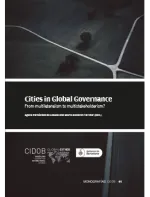Cities in Global Governance. From multilateralism to multistakeholderism?

Monografia CIDOB nº 81
Cities have been advocating for a seat at the global table for decades. They are part and parcel of the international system, yet they remain structurally powerless and virtually invisible under international law. For local governments and their networks to gain greater leverage within the current global and regional governance architecture, its legal structures, institutions and norms need to be rewired. But, what principles and models underpin this reform agenda? Which specific strategies and proposals are on the table? Are they yielding results?
In seeking answers to these questions, this volume discusses the opportunities and constraints affecting cities’ political agency within the contemporary global order, while addressing the tensions and complementarity between the two strategies for bringing urban concerns and interests to the global stage. On the one hand, it examines the prospects of reforming the current multilateral system, today in crisis. On the other, it analyses the promises and perils of “multistakeholderism” as an alternative, seemingly more inclusive, governance framework. Further, it delves into how city diplomacy is being reconfigured towards more innovative practices that operate both within and outside the traditional multilateral system, encouraging urban experimentation and new forms of public–private alliances.
This CIDOB monograph aims to contribute to the policy and academic discussion on the reform of the multilateral system by unpacking the role of cities and their networks in global and regional governance, spelling out the policy implications and making recommendations on how cities can gain global leverage that extends beyond the merely symbolic.
ISBN: 978-84-92511-90-7 / D.L.: B 2909-2021
Keywords: cities, global governance, multilateralims, global order, multistakeholderism, city networks, pandemia, international law